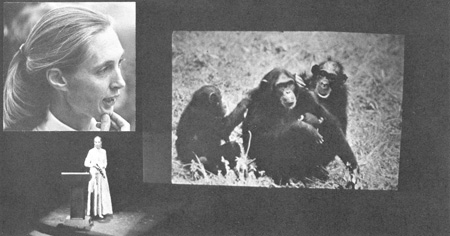In the Shadow of Man

Jane Goodall.
"Man overshadows the chimpanzee fantastically. But the strange dichotomy of good and evil which we find, not only in man but also in the chimp, is particularly interesting."
Man/chimp comparisons were drawn Saturday for a capacity audience at the seventh and last program in the Fermilab Bicentennial Lecture Series. Speaking was Dr. Jane Goodall, observer of wild chimps at a research center in Tanzania, East Africa, for 16 years. "In the Shadow of Man" was her topic.
Her appearance was under the auspices of the L.S.B. Leakey Foundation. The foundation's late namesake launched Dr. Goodall's career as a researcher and during her career she has documented certain behaviors, thought to be unique in man, as also being practiced by chimps.
Her slide and film lecture revealed struggles for dominance with the chimp community; group hunting and food sharing; relationships between family members; significance of aging process; and the sequence from infancy through childhood and adolescence to maturity and old age.
Her observations, the speaker said, have strengthened her conviction that understanding chimp behavior may provide important insights about the evolution of man's social behavior.
The chimp is man's closest animal relative alive today, Dr. Goodall said. "We are primates, too," she noted, citing modern man's evolution up a long ladder from monkey-like forebearers. "Our studies show the chimp is closer to man than anybody would have given him credit for 10 years ago," she said.
While acknowledging man's superior intellectual, language and creative capabilities, Dr. Goodall pointed out that man's negative and destructive tendencies also overshadow those of chimps. World War II and horrors of concentration camps were mentioned as examples.
"We are trying to shed some new light on ways which we can look into human behavior. And if we can do that, then our research will be very worthwhile," Dr. Goodall said.


